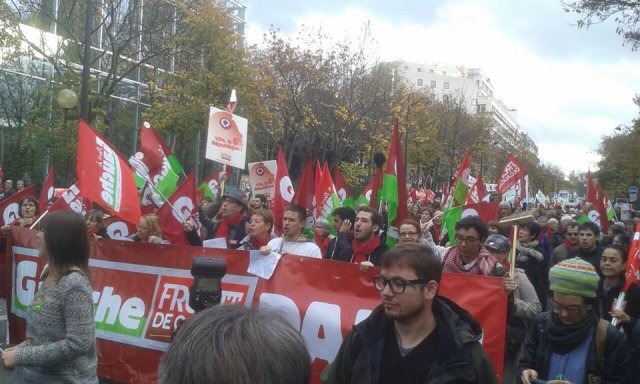
A coalition of French left groups held nation-wide demonstrations on November 15 against the new austerity budget of the unpopular Socialist Party (PS) government.
The protests called for a redistribution of wealth from finance and big business to workers and the poor, creating jobs, increasing social security and cohesion, and beginning an ecological transition of society.
Called by the anti-austerity group Collective 3A, organisers said the protests drew 30,000 people in Paris. More than 30 other cities across France staged rallies, including several thousand in Toulouse.
The strength of the event lay in its demonstration of a broad unity to the left of the Socialist Party. The recently formed Collective 3A brought together more than 70 different political parties, campaign groups and unions.
Left groups represented include the Left Party, the French Communist Party, Together, the New Anti-Capitalist Party, the Greens, PS dissidents and the recently established Deal party.
The protest call-out also included activists from major unions as well as campaign groups covering issues of women’s rights, housing and independent media.
A statement from 3A noted: “Never, since the election of [PS President] Francois Hollande, has any appeal of this type brought together such a diversity of signatories.”
The demonstration came just after the mid-point of Hollande’s presidency. Hollande launched the second half of his five-year term early this month with a commitment to boost France’s economic growth.
A new budget aims to stimulate growth mainly through 40 billion euros in tax cuts to companies. The new budget aims to cut 50 billion euros in public spending by 2017.
In a bid to win back support from all sectors, Hollande declared: “Starting in 2015, there will be no new taxes on anyone.”
Left groups have criticised the new budget for blindly following the wishes of MEDEF, the main employers' association in France.
The government is trying to loosen restrictions on wages and working conditions, and on the statutory 35-hour working week.
The new budget also came under fire from Brussels for further putting off meeting the deficit target of 3% of national output set by the European Union. The French government had already delayed the target for two years.
Nonetheless, the EU commission allowed the budget to pass after France made several tweaks. These include cracking down on tax evasion as part of a pledge to the EU to raise an extra 3.6 billion euros.
This is just another of a series of crises that has plagued the Hollande government and intensified his abysmal standing in the polls.
Already the least popular president since the advent of opinion polls in the 1970s, Hollande’s popularity continues its death-spiral. It has now reached a mere 12%, with 97% believing he has failed to kickstart the economy.
It is not hard to see why Hollande is fairing so badly in the polls. Presiding over a chronically stagnant economy and growing social crises, Hollande has followed a strategy of conciliating with big business and the EU.
This strategy stands in contrast to his promises during his 2012 election campaign. During the campaign, Hollande declared that he was an “enemy of finance”.
He pledged to renegotiate the European fiscal treaty and end the austerity politics of the outgoing Sarkozy government, oppose any rise in the goods and services tax and support workers' rights.
After his election, he dropped this entire program and began an austerity drive of his own. Unemployment also remains well above 10%, despite Hollande’s pledge to lower it.
In a television appearance launching the second half of his mandate, Hollande indicated that he would not seek re-election if unemployment continues to worsen.
A recent poll indicates 71% of voters would prefer PS Prime Minister Manuel Valls to Hollande as president.
Yet such an arrangement is likely to make matters worse for the PS.
Staunchly pro-corporate, Valls has called for the PS to “reform itself or die”. He is worsening a growing schism in a party increasingly aware that it is heading towards a huge defeat.
The budget passed the lower house of French parliament late last month by a majority of only 25 votes, with 34 Socialist Party MPs abstaining.
Recently, a group of more than 50 PS members, including several leaders, and its youth group released a statement supporting Jean-Luc Melenchon’s Movement for the Sixth Republic (M6R), which is highly critical of the Hollande government.
The Left Front, the largest group to the left of the PS, continues a more than year-long debate about strategy between its major components, the Left Party and the Communist Party. This centres on whether to form electoral alliances with the PS on progressive platforms or keep a firm distance to avoid being stigmatised by opposition to PS measures.
A potential rapprochement between the two groups may be emerging. A growing number of Communist Party members are questioning the strategy of joint tickets with the PS.
Meanwhile, Melenchon, who stood down as co-president of the Left Party earlier this year, has launched the M6R.
The M6R calls for a nationwide constituent assembly process that aims to write a new constitution to found a new republic and enshrine fundamental social, environmental and personal rights.
The Left Front, the 3A coalition and the M6R represent three ways the French left is exploring strategies of regroupment to bring together a coherent and effective response to the collapse of support for the PS.
The stakes are high. With the centre-right opposition UMP party embroiled in its own leadership scandals, it is the far-right National Front led by Marine Le Pen that is making the greatest gains from the political and economic instability.
Like the article? Subscribe to Green Left now! You can also like us on Facebook and follow us on Twitter.